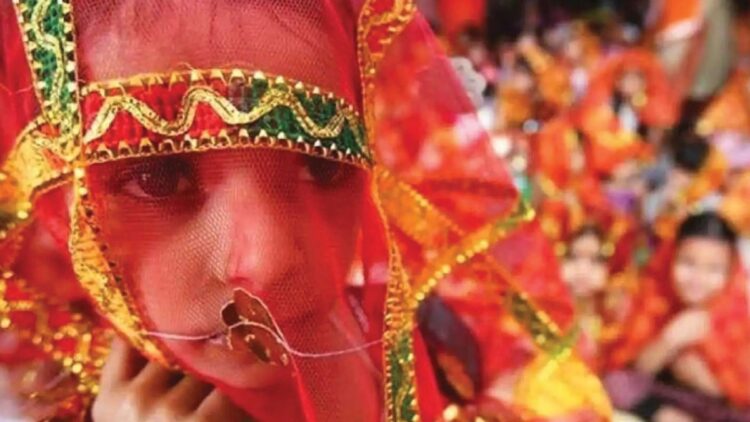Five people have been arrested for abetting child marriage and human trafficking in Madhya Pradesh’s capital Bhopal. A 12-year-old girl was sold for marriage to a 27-year-old man on June 27.
The arrests were made after women and child welfare department officials prevented the marriage of a 12-year-old tribal girl with a 27-year-old man on June 27 in a village under Gunaga police station limits near Bhopal, police said.
According to police, the girl’s parents had sold the girl for Rs 40,000 and received an advance of Rs 20,000, with the remaining amount to be handed over to them after the wedding.
Superintendent of Police (SP, Bhopal rural), Kiranlata Kerketta said, “We received information from the Women and Child Development Department about a child marriage in Gunaga police station area on Monday (June 26) following which we reached the spot and saw that the ‘haldi’ ceremony was taking place. On inquiry it was found the girl was 12 years old and the person whom she was getting married to was 27 years old.”
The minor told police that her parents had fixed her marriage for Rs 40,000 and they had dimissed her protests, SP Kerketta said.
The police approached the family and detained the minor girl and arrested six including two from the bridegroom’s family – son and his father – and three from bride’s family – her father, mother and maternal grandmother besides the middlewoman.
The officer added that a case was registered against five persons so far, including the parents of the minor girl, the bridegroom and his parents under the Human Trafficking, Juvenile Justice Act, Prohibition of Child Marriage Act, SC/ST Act.
All these accused have been arrested, police said.
Further investigation into the matter is underway, the police official said adding that cases would be lodged against those who worked as brokers or were if they were found to be involved in the case.
Child marriage (i.e., marriage of girls below the age of 18 and boys below the age of 21) in India is one of the most serious crimes committed against children. It is prevalent in most of the States/UTs despite a law (Prohibition of Child Marriage Act, 2006) to root it out. Child marriage ends childhood and puts children at high risk of violence, exploitation, and abuse. It also adversely impacts their rights to education, health and protection.
A total of 1,49,404 crimes against children were recorded in India in 2021, indicating an average of 409 such cases reported each day during the year. This included a total of 1,050 cases registered under the Prohibition of Child Marriage Act, victimising 1,062 children. Of all the registered crimes against children across the country in 2021, a staggering 13 percent were from Madhya Pradesh alone (19,173). The state stands at the 1st position, in terms of percentage share of the total crimes committed against children during 2021 in the country.
A comparison with last year’s reported crimes in Madhya Pradesh shows a 13 percent increase in the total number of crimes against children (from 17,008 in 2020). The number of victims of child marriage decreased only marginally (from 5 in 2020 to 4 in 2021), compared to the national average of 34 percent increase (from 792 victims in 2020 to 1,062 in 2021).
During the last 3 years, the number of victims of child marriage in Madhya Pradesh has remained more or less unchanged, from 4 in 2019 to 5 in 2020 to 4 again in 2021. While there is a 3.5 percentage point decrease in women aged 20-24 years falling prey to child marriage between 2015-16 and 2019-21 (from 26.8 percentage to 23.3) in India, there has been a greater fall (9.3 per cent) in Madhya Pradesh (from 32.4 per cent to 23.1 per cent) during the same period.
As per the Census 2011, in Madhya Pradesh, a little more than 8.9 lakh children were married off before the attainment of the legal age of marriage, which constituted approximately 7 percent of all married children in the country. However, NCRB data suggests that cases of only 13 children were registered in the state under the Prohibition of Child Marriage Act during 2019-21.




















Comments